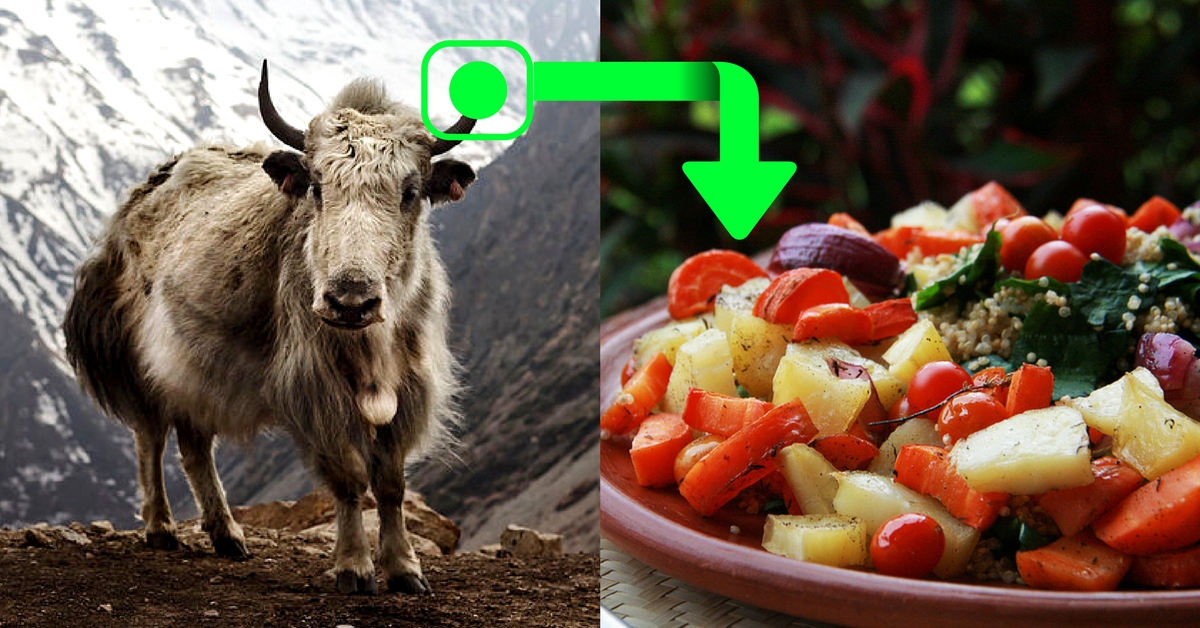Veg Diets Just Got More Nutritious With Enzyme From Yak Cheese. Here’s Why!
A recent study by the students of IIT-R has identified a new enzyme from yak cheese which has the potential of enhancing the micronutrient value of a vegetarian diet.

Vegetarians like me are often at the receiving end of many questions, and among all of them, there is a pertinent one—how do we get out protein fix? Although pulses and nuts are full of proteins, they are arguably not as rich as meat—if consumed in the same quantity.
However, students of IIT-Roorkee (IIT-R) have come up with a solution!
A recent study by the students of IIT-R has identified a new enzyme from yak cheese which has the potential of enhancing the micronutrient value of a vegetarian diet.
This enzyme, called ‘phyLF,’ could be used to boost the nutritional value of vegetarian meals consumed by infants, pregnant women and senior citizens.

Vegetarian diets often lack micronutrients like phosphorous, and the enzyme hopes to tackle this deficiency.
Naveen Kumar Navani, an Associate Professor in the Department of Biotechnology in IIT-R, spoke to the Times of India and explained why this enzyme would enhance vegetarian diets.
“In plants, phosphorus is stored mainly as organic phosphorous called ‘phytate,’ which is an anti-nutritional factor (ANF). Nuts, seeds, beans and whole grains are rich in phosphorous, while vegetables and fruits have it in lesser quantity. Despite this, people with vegetarian diets don’t only exhibit a deficiency of phosphorous but also other minerals.
This is because humans lack an enzyme called phytase, which is needed to convert phytate into free phosphorous for absorption by the body,” he said.

The phyLF enzyme was identified and cloned by the IIT-R students and is characterised by a probiotic bacterium called ‘Lactobacillus fermentum NKN51.’ This bacterium was found in ‘chhurpee’ the cheese made from Yak milk, consumed across the Himalayan regions.
You may also like: In a Big Breakthrough, IIT Roorkee Finds Molecule That Can Kill Chikungunya Virus!
According to a report by the Food and Agriculture Organisation, micronutrient deficiency affects one in three people, globally. This deficiency is also called hidden hunger, and the lack of phytase in humans is a major cause of this.
This discovery and cloning of phyLF might be useful to vegetarians who need more nutrition than others.
“In the long term, this enzyme could be used to enhance the micronutrient availability to infants, pregnant women and elderly,” Navani added.
(Edited by Gayatri Mishra)
Featured image for representational purpose only. Source.
Like this story? Or have something to share?
Write to us: [email protected]
Connect with us on Facebook and Twitter.
NEW: Click here to get positive news on WhatsApp!
If you found our stories insightful, informative, or even just enjoyable, we invite you to consider making a voluntary payment to support the work we do at The Better India. Your contribution helps us continue producing quality content that educates, inspires, and drives positive change.
Choose one of the payment options below for your contribution-
By paying for the stories you value, you directly contribute to sustaining our efforts focused on making a difference in the world. Together, let’s ensure that impactful stories continue to be told and shared, enriching lives and communities alike.
Thank you for your support. Here are some frequently asked questions you might find helpful to know why you are contributing?


This story made me
- 97
- 121
- 89
- 167










